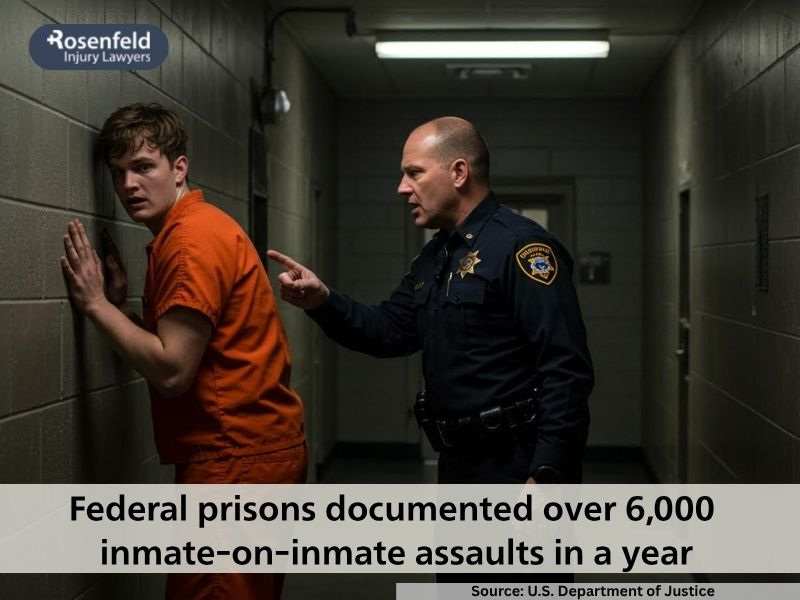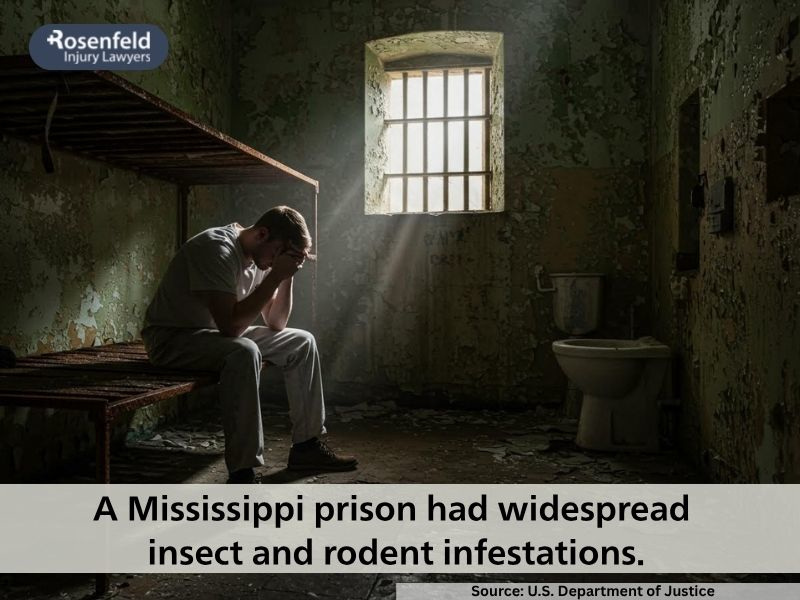What Is Prison Misconduct?
The prison system in the United States is designed to punish those who have been convicted of crimes, but it is also supposed to protect and rehabilitate them. Unfortunately, many inmates become victims of prison misconduct perpetrated by employees at these institutions, such as guards, medical care personnel, or administrators.
At Injury Lawyer Team, we represent victims of misconduct in the criminal justice system. Our attorneys will stand by your side to hold these institutions and individuals accountable for their behavior, whether you suffered from abuse, mistreatment, neglect, or other forms of harm.
We have the experience necessary to build a strong case and fight for the compensation you deserve for legal damages caused by staff or inmate misconduct.

A Systematic Review of Misconduct Cases Involving Incarcerated People
One of the most pressing concerns in these facilities is misconduct perpetrated by employees. Available data suggest this is a prevalent issue across the United States.
For example, the Bureau of Prisons has published statistics about misconduct allegations between 2014 and 2023 fiscal years. The number of employee misconduct allegations during these years fell within a range of 7,658 and 12,168. In 2024, the number of incidents rose to 14,907.
The Federal Bureau of Justice Statistics also amassed data regarding misconduct in prisons, specifically related to sexual behaviors. In 2020, the rate of sexual victimization for substantiated claims was 1.2 incidents per 1,000 inmates. The number of reports of misconduct included:
- 8,628 complaints of staff sexual misconduct
- 7,449 complaints of staff sexual harassment
- 6,370 cases of nonconsensual sexual acts
- 4,496 complaints of abusive sexual contact
What Types of Misconduct Do Many Inmates Suffer in the Criminal Justice System?
Misconduct can take many forms in a prison setting. Suppose you are an inmate who has suffered in a correctional facility. In that case, you may have the right to sue the administration or individual employees who are at fault for your legal damages.
Let’s look at some examples of misconduct that staff members may perpetrate in a correctional institution:
- Prison guards verbally abusing inmates by yelling at them or threatening them
- Staff members failing to protect inmates from each other by not locking cell doors
- Medical personnel enforcing physical exams that are unnecessary and lead to sexual abuse
- Correctional administrators ignoring the medical, sanitary, or nutritional needs of inmates
- Staff members having unexcused absences, resulting in a lack of supervision
- Guards isolating individual inmates and committing sexual violence or other acts against them
- Placing certain inmates in the general population who should be isolated due to elevated risks
These scenarios can create dangerous circumstances for inmates, which may lead to physical or emotional suffering. Therefore, victims of misconduct could be eligible for lawsuits against the facilities that failed to protect and care for them.
What Are Common Types of Prison Inmate Misconduct?
In many cases, those serving sentences commit dangerous acts against other inmates. The prison administration and employees should prevent this type of conduct. However, poor practices and negligence can make it possible for the prison to become a dangerous place for the inmates.
Let’s look at some examples of inmate-on-inmate misconduct that could lead to a prison abuse lawsuit against the facility and its employees:
- Gang activity escalating to interpersonal violence in the facility
- Sexual assaults against inmates in areas with less supervision, such as bathrooms, closets, or private cells
- Verbal threats between prisoners
- Violent offenders committing abuse against others
- Special favors being awarded to some prisoners and not others
- Individual inmates committing rule violations related to tools or equipment they are allowed to access
Where Does Prison Environment Misconduct Typically Occur?
Prison staff have the important responsibility of protecting inmates, implementing security measures, and caring for the individual needs of each prisoner. The failure to do so often stems from negligent practices or improper training.
Some scenarios make the probability of misconduct more likely among the prison staff, such as:
- A lack of background checks leading to unqualified personnel
- A lack of training for employees who interact with prisoners
- Overlooking inmate assaults, allowing the misconduct to escalate
- Poor maintenance of security measures, such as aging locks or malfunctioning surveillance cameras
- Poor recordkeeping practices result in lost data on inmates
- A lack of supervision in medical appointments, allowing one-on-one abuse between medical professionals and inmates
These issues have become common in various state and federal prisons across the country. Let’s examine some of the most troublesome facilities in recent years that may pose dangers to employees and inmates.
Federal Prison
Federal prisons hold some of the largest inmate populations in the country. Here are a few of the largest and most notable facilities governed by the Federal Bureau of Prisons:
- Federal Correctional Institution (FCI) Fort Dix in New Jersey
- Coleman Federal Correctional Complex in Florida
- Federal Correctional Institution (FCI) Beaumont in Texas
- Federal Correctional Institution (FCI) Yazoo City in Mississippi
State Prison
There are many state prisons throughout the United States as well. These facilities are managed by local departments rather than the federal government. This list includes many women’s facilities, which are especially problematic in terms of sexual abuse lawsuits.
Here are some state prisons with significant populations or allegations of misconduct:
- Louisiana State Penitentiary
- Central California Women’s Facility (CCWF)
- California Institute for Women (CIW)
- Folsom Women’s Facility
- Valley State Prison for Women (VSPW)
- San Quentin State Prison
Juvenile Halls
Another category of corrections is juvenile detention centers. In these institutions, underage inmates are secured and rehabilitated in separate locations from adult offenders. Unfortunately, these populations are extremely vulnerable to abuse and neglect due to the larger power dynamic between staff members and inmates.
Here are some of the most notable juvenile institutions in the country that could violate inmate safety:
- East Mesa Juvenile Detention Facility (EMJDF) – California
- Kearny Mesa Juvenile Detention Facility (KMJDF) – California
- Girls’ Rehabilitation Facility (GRF) – California
- Los Padrinos Juvenile Hall – California
- Cook County Juvenile Detention Center (JTDC) – Illinois
- Kane County Juvenile Justice Center (JJC) – Illinois
- New Jersey Training School – New Jersey
- Charles H. Hickey School – Maryland
- Thomas Waxter Detention Center – Maryland
- Cheltenham Youth Detention Center (CYDC) – Pennsylvania

What Legal Options Do Victims Have?
Although discipline is important in the context of a prison, it applies to the staff as well. Misconduct against inmates cannot be tolerated, no matter the victim’s prior record or charges. Fortunately, there is a way for inmates who have been wronged to seek justice against the at-fault parties.
Injury Lawyer Team can stand by your side as you pursue a personal injury claim against the individual abuser or institution. Our attorneys have the experience necessary to protect your rights under state and federal laws. With a successful claim, you could recover compensation for the following legal damages:
- Medical expenses associated with treatment for your injuries
- Diminished income potential if your injuries affect your ability to work in the future
- Emotional distress, such as anxiety, depression, Post-Traumatic Stress Disorder, and other psychological challenges
- Pain and suffering from physical injuries or treatment strategies
- Loss of enjoyment of life
Our attorneys work on a contingency fee basis, which means you pay nothing unless we win. We also offer a free, no-obligation consultation so you can ask questions about the claims process or your individual circumstances. Our legal services include:
- Conducting an investigation of the corrections misconduct
- Gathering evidence of negligence, such as witness statements, medical records, and surveillance footage
- Interpreting the laws in your state to protect your individual rights
- Assessing all legal damages caused by your suffering
- Working with experts to establish liability for the injuries
- Negotiating for fair compensation from defendants and insurance companies
- Litigating in civil court if a settlement cannot be reached
If you believe you have been the victim of inmate misconduct, contact our top-rated law firm today at 866-757-6452 to schedule a free consultation about your case. Together, we will ensure the negligent parties are held accountable for failing to protect you from harm.
All content undergoes thorough legal review by experienced attorneys, including Jonathan Rosenfeld. With 25 years of experience in personal injury law and over 100 years of combined legal expertise within our team, we ensure that every article is legally accurate, compliant, and reflects current legal standards.








